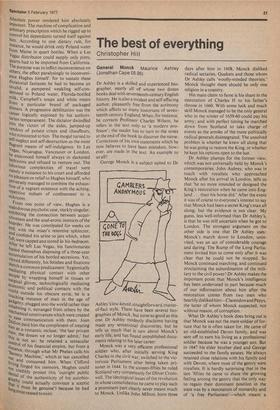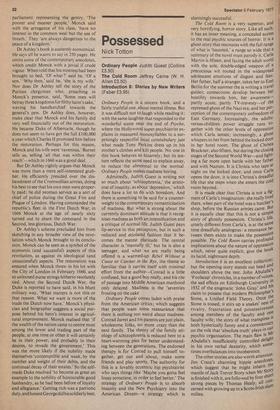The best of everything
Christopher Hill
General Monck Maurice Ashley (Jonathan Cape £6.95)
Dr Ashley is a skilled and experienced biographer, nearly all of whose two dozen books deal with seventeenth-century English history. He is also a modest and self-effacing author, pleasantly free from the acrimony which affects so many historians of seventeenth-century England. When, for instance, he corrects Professor Charles Wilson, he refers in the text only to 'a modern professor'; the reader has to turn to the notes at the end of the book to discover the name. Corrections of his own statements which he now believes to have been mistaken, however, are made in the text. An example to us all!
George Monck is a subject suited to Dr Ashley's low-keyed, straightforward, matterof-fact style. There have been several biographies of Monck, but none so good as this one. Dr Ashley modestly disclaims having made any sensational discoveries, but he tells us much that is new about Monck's early life, and has found unpublished documents relating to his later career.
Monck was a very efficient professional soldier who, after initially serving King Charles in the civil war, switched to the victorious Parliament after being taken prisoner in 1644. In the sixteen-fifties he ruled Scotland very competently for Oliver Cromwell. The ideological issues of the revolution in whose consolidation he came to play such a prominent part clearly never meant much to Monck. Unlike John Milton, born three days after him in 1608, Monck disliked radical sectaries, Quakers and those whom Dr Ashley calls 'woolly-minded theorists.' Monck thought there should be only one religion in a country.
His main claim to fame is his share in the restoration of Charles II to his father's throne in 1660. With some luck and much skill Monck managed to be the only general who in the winter of 1659-60 could pay his army; and with perfect timing he marched down from Scotland to take charge of events as the armies of the more politically radical generals disintegrated. The unsolved problem is whether he knew all along that he was going to restore the King, or whether he kept his options open to the last.
Dr Ashley plumps for the former view, which was not universally held by Monck's contemporaries. John Aubrey, who was in touch with royalists who approached Monck after his arrival in London, tells us that 'he no more intended or designed the King's restoration when he came into England ... than his horse did.' After the event it was of course to everyone's interest to say that Monck had been a secret King's man all along, but the evidence is not clear. My guess, less well-informed than Dr Ashley's, is that he was still uncertain when he got to London. The strongest argument on the other side is one that Dr Ashley uses: Monck's march down to London, uninvited, was an act of considerable courage and daring. The Rump of the Long Parliament invited him to come only after it was clear that he could not be stopped. So Monck continued marching, and continued proclaiming the subordination of the military to the civil power! Dr Ashley makes the important point that Monck's intelligence has been,underrated in part because much of our information about him after the restoration comes from two men who heartily disliked him—Clarendon and Pepys, the latter of whom Monck suspected, not without reason, of corruption.
What Dr Ashley's book does bring out is that Monck was not the mere soldier of fortune that he is often taken for. He came of an old-established Devon family, and was sent off to earn his living as a professional soldier because he was a younger son. But in 1647 his elder brother died and George succeeded to the family estates. He always retained close relations with his family and with Devon, where most of the gentry were royalists. It is hardly surprising that in the late 'fifties he came to share the growing feeling among the gentry that the only way to regain their dominant position in the state was by a restoration of monarchy and of 'a free Parliament'—which meant a parliament representing the gentry. 'The poorer and meaner people,' Monck said with the arrogance of his class, `have no interest in the common weal but the use of breath.' They 'are always dangerous to the peace of a kingdom.'
Dr Ashley's book is austerely economical. He says all he wants to say in 250 pages. He omits some of the contemporary anecdotes, which credit Monck with a jovial if crude vigour. When told that his mistres5 had been brought to bed, 'Of what ?' said he. 'Of a son,' Why then,' said he, 'she is my wife.' Nor does Dr Ashley tell the story of the Puritan clergyman who, preaching in Monck's presence, said, 'Some men will betray three kingdoms for filthy lucre's sake,' waving his handkerchief towards the general's pew. Dr Ashley does, however, make clear that Monck and his family did very well financially out of the restoration. He became Duke of Albemarle, though he does not seem to have got the full £.100,000 a year which Charles II promised him before the restoration. Perhaps for this reason, Monck and his wife were 'ravenous,' Burnet tells us, selling 'all that was within their reach'—which in 1660 was a good deal.
But Dr Ashley rightly argues that Monck was more than a mere self-interested grabber. He efficiently presided over the disbandment of the Cromwellian armies, doing his best to see that his own men were properly paid; he did yeoman service as a sort of chief of police during the Great Fire and Plague of London. Having commanded the republic's fleet in the First Dutch War, in 1666 Monck at the age of nearly sixty turned out to share the command in the Second, less glorious, Dutch War.
Dr Ashley's scheme precluded him from sketching in any broader view of the revolution which Monck brought to its conclusion. Monck can be seen as a symbol of the economic (and successful) aspects of this revolution, as against its ideological (and unsuccessful) aspects. The restoration was ensured when Monck threw in his lot with the City of London in February 1660, and so unloosed purse strings hitherto resolutely tied. About the Second Dutch War, the Duke is reported to have said, in his blunt military way, 'What matters is not this or that reason. What we want is more of the trade the Dutch now have.' Monck's physician and biographer suggests a social purpose behind his hero's interest in agricultural improvement. Monck realised that 'if the wealth of the nation came to centre most among the lower and trading part of the people, at one time or other it will certainly be in their power, and probably in their desires, to invade the government.' This was the more likely if the nobility made themselves 'contemptible and weak, by the number and weight of their debts, and the continual decay of their estates.' So the selfmade Duke resolved `to become as great an example to the nobility of honourable good husbandry, as he had been before of loyalty and allegiance.' Getting rich was a patriotic duty, and honest George did his soldierly best.



































 Previous page
Previous page